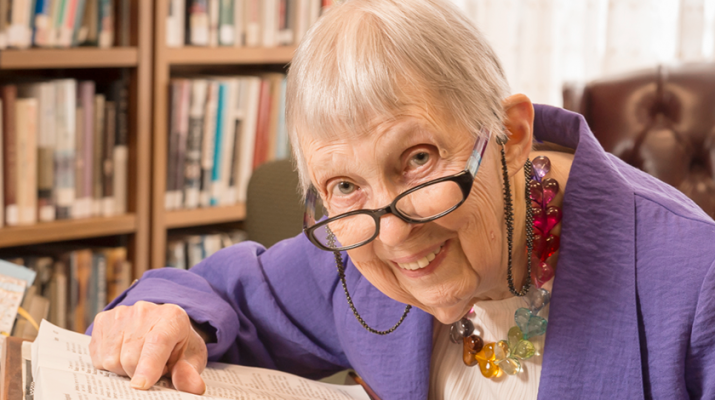By Deborah Jeanne Sergeant
It’s not polite to ask a lady her age. But Lucretia McClure, a resident at Episcopal SeniorLife Communities in Rochester, happily volunteers that she’s 93.
At her age, it’s a badge of honor.
McClure lives at Valley Manor, one of the Episcopal SeniorLife Communities in Rochester and serves as the community’s librarian.
McClure had worked as a medical librarian at Harvard’s Countway Library of Medicine and University of Rochester Medical Center, where she logged 50 years. McClure retired at age 85. She has relished working at the Valley Manor’s library since 2012 and helped prepare it for opening by May 2017. The library boasts 3,000 donated and purchased titles which McClure has cataloged. For her efforts, Valley Manor named the facility for McClure.
Though born in Denver, McClure has lived in Rochester most of her life. She likes that Valley Manor is close to where she lived and that working at the library “takes me back to the early days of library work,” she said.
Unlike many public libraries, the library at Valley Manor still uses a physical card catalog, in deference to residents’ preference. McClure thinks that could change in a few years, however.
Alison B. Miller, public relations and communications coordinator for Valley Manor, said that the library “is a big drawing point for this community.”
Many in the community are retired professionals that enjoy reading books about current events and also popular novels, according to McClure.
While working daily at a library may seem a strange way for a 93-year-old to spend her days, McClure thinks that staying busy and finding a purpose have helped her age with very few health issues. She beat colon cancer a couple years ago and has no other health problems now.
She also sparks her interest listening to the various guest speakers who visit Valley Manor.
She walks for exercise, not wanting to take time away from her library work to attend exercise classes offered in the community.
“I carry and shelve books,” she said. “I have a job and can’t run around and enjoy things like that.”
She reads many of the new titles so she can recommend them to patrons, but can’t keep up with the flood of 20 books per month.
McClure thinks that people who have no purpose in life are more likely to suffer in health.
She also thinks that “it’s no good to worry and good to be busy. Those who don’t stay busy wither on the vine.”
Although she acknowledges good genes as one key to healthy long life, she thinks that “living a decent life, eating your vegetables and doing good things” helps out, too.
But her top recommendation is to “join up and do something.”
Brian Heppard, medical director and attending physician at Episcopal SeniorLife Communities, thinks along similar lines.
“It’s really meeting a holistic view, not only physical health, but emotional, spiritual and mental health,” he said. “All four are really important. People need to feel they have a purpose. It’s especially true for older people who maybe have retired and family has moved out of the area. They can feel they don’t have a purpose and that can precipitate a decline.”
Social engagement with a couple close friends and involvement in volunteering helps older adults feel more connected.
Physical activity is also important. Heppard encourages walking, but anything that’s enjoyable and fun can help an older adult keep moving.
“Watch your weight so it’s not too low or too high,” he said. “Have visits with your primary care doctor to regularly review medication with an eye for what can be stopped. The medical literature says poly pharmacy can be very dangerous for older adults.”
Eating a balanced, moderate diet — not fad diets — can help maintain a healthy weight.
“We focus a lot on people being overweight, but it’s OK to be a little plump when you get older,” Heppard said. “If you have an extra 10 to 15 pounds, you have some caloric reserves if you have a stroke or pneumonia.”
He also recommended not smoking and drinking only in moderation: one serving of alcohol daily for women and no more than two daily for men.
Reducing fall risk can help extend healthy old age. Maintaining physical fitness, improving the home environment (such as better lighting that can be found on my latest blog post and nixing trip hazards) and using assistive devices as needed can help minimize fall risk.
Many older people experience isolation since friends and family may have already passed away. Heppard said that for some, faith and spirituality help them cope, as well as recognizing the beauty in life despite tragedies.
“There’s a recognition that loss is a part of life,” Heppard said. “They don’t let it become all-consuming. There’s an ability to transcend and move beyond.”

